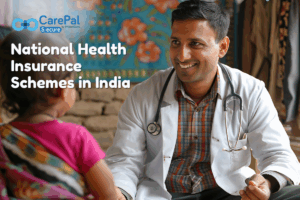Cancer Insurance Policies in India:
Everything You Need to Know

In India, where cancer rates have steadily risen, the disease is becoming an increasing source of worry. According to recent projections, there were between 1.9 million and 2 million new instances of cancer reported in India in 2022, highlighting the serious impact this health issue will have on the country. Consequently, the importance of a robust cancer insurance policy for cancer patients cannot be overstated.
In this blog, we will examine the crucial role of cancer insurance policies, encompassing their coverage, advantages, exclusions, claims procedures, and other relevant aspects.
What Is A Cancer Insurance Policy?
A critical illness insurance plan, commonly referred to as a cancer insurance policy, is a specific health insurance policy designed to provide financial support in the unfortunate case of a cancer diagnosis.
Contrary to normal health insurance plans, which cover a wide range of medical costs, these insurance policies are carefully crafted to address the unique demands and challenges people face with cancer. This insurance policy offers a targeted and all-encompassing defense against the demanding financial costs of cancer care and treatment.
What Types Of Cancers Are Covered In This Policy?
These insurance policies typically cover a wide spectrum of cancers, including, but not limited to:
- Breast Cancer
- Lung Cancer
- Prostate Cancer
- Colorectal Cancer
- Cervical Cancer
- Ovarian Cancer
- Leukemia
- Lymphoma
- Kidney Cancer
- Pancreatic Cancer
Before you buy medical insurance, it’s important to thoroughly review the policy documentation and comprehend the terms and conditions since the types of cancer covered may differ between insurance companies.
Benefits Of Cancer Insurance Policies
Facing a cancer diagnosis can be an emotionally and financially challenging journey. To help individuals cope with the substantial financial burdens that accompany cancer treatment, these policies offer a range of invaluable benefits:
Financial Security:
A cancer diagnosis can result in significant medical expenses, including surgery, chemotherapy, radiation therapy, and hospitalization. Cancer insurance provides financial security by covering these expenses, helping to ease the financial burden on the patient and their family.
LumpSum Payment:
Most insurance policies for cancer provide a lumpsum payment upon a cancer diagnosis. This lumpsum can be used at the policyholder’s discretion for medical bills, transportation, or other daily expenses.
Additional Coverage:
Some policies cover additional expenses such as home healthcare, hospice care, and experimental treatments, which regular health insurance plans may not cover.
This comprehensive coverage ensures that cancer patients can focus on their recovery without worrying about mounting medical bills and other associated costs.
Why The Need For Cancer Insurance Coverage?
Several compelling reasons highlight the importance of having an insurance policy for cancer:
- High Medical Costs: Cancer treatments can be financially draining, including surgery, chemotherapy, and radiation therapy.
- Limited Health Plans: Standard health insurance may not cover all cancer-related expenses, leaving gaps in coverage.
- Specialized Care: Cancer insurance offers tailored coverage for diagnostic tests, experimental treatments, and even transportation and lodging expenses for treatment centers.
- Income Protection: It can provide financial support if the patient or their caregiver is unable to work during treatment.
- Extra Security: Supplementing existing insurance with cancer coverage ensures individuals are well-prepared for a potential cancer diagnosis.
- No Deductibles: Most cancer insurance plans do not have deductibles, making it easier to access the benefits when needed.
In essence, these policies offer a comprehensive solution, providing financial security, and support for current health insurance coverage. It is an essential safety net for people and families with cancer diagnosis and treatment uncertainties.

How You Can Avail The Best Health Insurance For Cancer Patients
When searching for the best health insurance policy for cancer patients, here are some steps to consider:
- Research and compare: Research different insurance providers and their policies. Compare the coverage, premiums, and benefits offered by each plan.
- Assess your needs: Consider your requirements, your financial circumstances, and any cancer in the family history. This will enable you to choose the right level of insurance protection.
- Read the fine print: Carefully read the policy documents, paying attention to any exclusions and waiting periods. Ensure that you understand the terms and conditions before making a decision.
- Seek professional advice: Consult an insurance advisor or financial expert who can provide personalized guidance based on your situation.
What Exclusions Are Associated With A Cancer Insurance Cover?
While insurance policies for cancer provide essential coverage, it’s crucial to know that they often come with specific exclusions that can vary among insurance providers. These exclusions are established to manage risk and maintain the affordability of the policies. Here are some common exclusions frequently encountered in these policies:
- Pre-existing Conditions: Most cancer policies do not extend coverage to cancer diagnosed or existing before the policy was purchased. This exclusion ensures that individuals do not purchase insurance after a cancer diagnosis solely for financial gain.
- Early-Stage Cancers: Certain policies may exclude early-stage or less severe cancer coverage. For instance, they might not cover Stage 0 or very early-stage cancers. This exclusion is often in place to concentrate on providing support for advanced or more critical cases, ensuring that policyholders receive comprehensive assistance when facing serious health challenges.
- Waiting Periods: These policies typically involve a waiting period before they become effective. During this waiting period, cancer-related claims are not payable. This precaution discourages individuals from purchasing insurance immediately upon learning of a cancer diagnosis.
- Non-Diagnostic Expenses: Expenses related to the diagnostic phase, such as medical tests, consultations, and screenings, may not be covered by certain policies. The focus of cancer insurance is usually on the treatment phase rather than the initial diagnosis.
- Alternative Therapies: Certain alternative or experimental cancer treatments may not be covered under standard insurance cancer policies. These exclusions aim to maintain the financial viability of the policies while adhering to established medical guidelines.
- Understanding these exclusions is essential to making informed decisions when selecting an insurance policy for cancer. It’s advisable to review the terms and conditions of the policy carefully, seek clarification from the insurance provider, and consider the specific needs and circumstances of the insured individual before making a choice.
How Do the Claims Process And Payment Work?
The claims process for cancer insurance policies typically involves the following steps:
- Diagnosis: When diagnosed with cancer, inform your insurance provider immediately. Provide them with all the necessary medical documents, including the diagnosis and treatment plan.
- Claim Submission: Fill out the claims form provided by the insurance company and submit it along with the required documents. These documents may include medical reports, bills, and prescriptions.
- Claim Review: The insurance company will review your claim to ensure it meets the policy’s criteria. This may involve verifying the diagnosis and treatment details.
- Approval and Payment: Once your claim is approved, the insurance company will pay you or your nominee a lumpsum payment per the policy terms. This payment can be used to cover medical expenses and other associated costs.
- Follow-up: Keep records of all expenses and follow up with the insurance company for any additional documentation they may require during the claims process.
Therefore, in case of a cancer diagnosis, timely and accurate claim submission, followed by diligent follow-up, ensures a smoother path toward financial support.
What Are The Best Cancer Insurance Plans In India?
Identifying the best insurance plans for cancer involves considering several factors, such as coverage, premiums, and individual needs. So here are some general characteristics to look out for when searching for the perfect plan.
- Comprehensive Coverage: Seek policies that offer a broad range of coverage, including diagnostic tests, treatments, surgeries, and even ancillary costs like transportation and accommodation.
- Affordability: Choose a plan with premiums that fit your budget without compromising necessary coverage.
- Flexible Payouts: Look for policies that provide flexibility in payout options, whether as a lumpsum or structured payments.
- Transparent Terms: Ensure the policy terms and conditions, including exclusions and waiting periods, are clearly explained.
- High Claim Settlement Ratio: Research insurers with a history of high claim settlement ratios, indicating a reliable claims process.
- Additional Benefits: Consider policies that offer additional benefits like critical illness riders or family coverage.
- Network Hospitals: Check if the insurer has tie-ups with reputable hospitals for cashless treatment facilities.
- Reviews and Ratings: Read reviews and ratings from other policyholders to gauge customer satisfaction and reliability.
Ultimately, the best plan will vary based on your unique circumstances and preferences, so thorough research and comparison are essential.
How Does Cancer Insurance Differ From Health Insurance?
Specific Focus: It is designed to cover cancer-related expenses, while health insurance offers broader coverage for various medical conditions.
LumpSum Payout: It typically provides a lumpsum payment upon diagnosis, whereas health insurance covers medical bills as they accrue.
Limited Scope: It has a narrower scope, primarily addressing cancer-related costs, while health insurance covers a wide range of medical treatments and procedures.
Supplemental: It often supplements regular health insurance, offering extra protection for cancer-related expenses.
In summary, cancer insurance stands as a crucial safeguard within the Indian healthcare landscape, especially in light of the escalating cancer burden and the formidable financial implications entailed by its treatment.
Furthermore, CarePal Secure Insurance offers access to a comprehensive healthcare plan beyond mere coverage. With CarePal Health Insurance, you can avail discounts on medicines and diagnostic tests, receive continuous round-the-clock support, and benefit from a holistic approach tailored to your healthcare needs.
By delving into the specifics, including the range of cancers covered, the manifold benefits, the intricacies of exclusions and the claims process, individuals can empower themselves to make informed choices when seeking optimal health insurance solutions for cancer patients.
Frequently Asked Questions
Good digestion ensures proper nutrient absorption, strengthens immunity, and boosts energy levels. It also prevents complications like weight gain, hormonal imbalances, and chronic diseases.
Consider the insurer’s financial stability, claims process, coverage terms, and inclusion of services like teleconsultation and diagnostic tests. These factors ensure smooth access to care and timely claim settlements.
Poor digestion can cause nutrient deficiencies, weakening the immune system and leading to fatigue. It’s also linked to weight gain, diabetes, and mental health issues.
Adopt a balanced diet rich in fiber and fermented foods, quit smoking, avoid alcohol, exercise regularly, and manage stress to support healthy digestion.
It offers comprehensive benefits, including hospitalization, diagnostic tests, and teleconsultation, with a reduced waiting period for pre-existing conditions and cashless treatments.
Hi, my name is Om, and I am a developer at Carepal Secure. With a strong passion for technology and innovation, I enjoy creating effective solutions and learning new skills to enhance my expertise. My journey in development has been both challenging and rewarding, allowing me to grow professionally while contributing meaningfully to the projects I work on.












